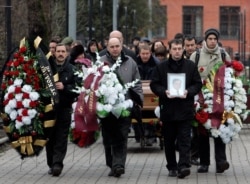The European Court of Human Rights (ECHR) has condemned Russia for "multiple violations" committed against Sergei Magnitsky, an anti-corruption lawyer who died in custody in 2009.
In its ruling on Tuesday, the court in Strasbourg said the treatment of Magnitsky's pancreatitis and other medical problems was "manifestly inadequate" and "unreasonably put his life in danger."
The court's seven judges for the case, including a Russian, ruled unanimously that the tax lawyer had been ill-treated by guards and been unjustly held for too long in pretrial detention.
They also denounced an "inherently unfair" posthumous trial that found Magnitsky guilty.
Russia was ordered to pay $37,800 to Magnitsky's wife and mother.
Russia's Justice Ministry said it would consider an appeal, noting in a statement cited by Russian news agencies that the court didn’t find evidence to back up claims of Magnitsky's arbitrary arrest and detention.
Still, James A. Goldston of the Open Society Justice Initiative, who represented Magnitsky's mother in the ECHR case, welcomed the ruling.
“Today, the system of laws in which [Magnitsky] placed such faith has finally given him and his family some measure of justice," Goldston said.
The court ruling was based on a complaint originally filed by Magnitsky himself in 2009, and later taken over by his family.
Magnitsky spent almost a year in Moscow’s Butyrka prison before he was transferred to another detention center in the capital, where he died in November 2009.
He was arrested and charged with tax evasion in November 2008 after exposing a scheme in which officials allegedly defrauded the Russian state of $230 million.
Magnitsky’s death at age 37 sparked U.S. and European Union sanctions, contributing to the deterioration of relations between Moscow and the West.





